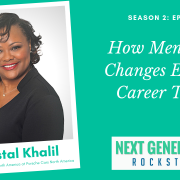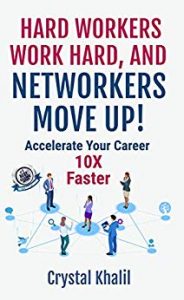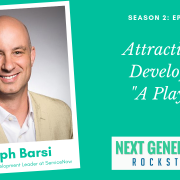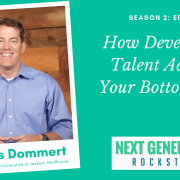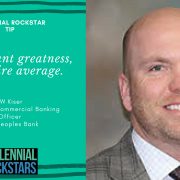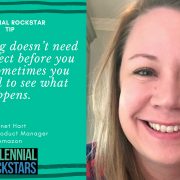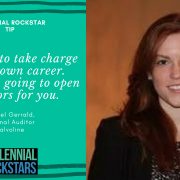Cassie Buckroyd: How Holistic Wellness Programs Can Take the Stress Out of Your Employees Lives
Our lives our busy and stressful these days. But what if our employers helped us face those things that are stressing us out? Things like #studentloandebt or becoming a #1sttimehomebuyer or finding the right doctor for your new baby? Cassie Buckroyd of Columbia Sportwear is leading the way for companies to take a holistic approach to employee well-being. Cassie knows that employees who are healthy and happy are more productive, efficient, innovative and tend to stay with their employers longer!
Cassie (Romano) Buckroyd is the Manager of Wellness Programs. As the first person to fill the Wellness Program Manager role in 2014, she spent 4 years building a comprehensive, robust corporate initiative focused on holistic wellbeing and employee development through self-care. Her programming is centered on physical, social, financial, career and community health.
Share the LOVE and TWEET about this episode.
Don't miss an episode. Subscribe to Next Generation Rockstars.
Disclaimer: This transcript was created using YouTube’s translator tool and that may mean that some of the words, grammar, and typos come from a misinterpretation of the video.
The Transcript - How Holistic Wellness Programs Can Take the Stress Out of Your Employees Lives
[00:00:00.060] - Amanda Hammett
Welcome to the Next Generation Rockstars podcast. If you are trying to figure out how do you recruit and retain this next generation of rock star talent while you are in the right place.
[00:00:14.490] - Amanda Hammett
Hey, this is Amanda Hammett and this is the Next Generation Rockstars podcast. And today we have an amazing gas. Her name is Cassie Buckroyd and she is with Columbia Sportswear where she is the manager of wellbeing programs. Cassie welcome to the show.
[00:00:29.790] - Cassie Buckroyd
Thanks for having me.
[00:00:31.230] - Amanda Hammett
Wonderful. I'm super excited to talk to you today.You guys are doing some really amazing things you you guys are really meeting your employees where they are in life and in their professional lives. And we're going to dive into that. But before we do much to tell the audience a little bit about you.
[00:00:50.310] - Cassie Buckroyd
Sure. So I am a native Oregonian born and raised near Portland which is where Columbia is headquartered just. In my spare time I enjoy the outdoors which is of course aligned with our brand. So it's great to work at a company like Columbia where I can live my my interest. I've been at Columbia for about five years now where I started as a wellness program manager really a bit of an individual fellow lone lone wolf. I like to call myself I was the first person in that position tasked with building wellness initiatives and kind of determining what that looks like.
[00:01:29.730] - Cassie Buckroyd
And so I've done that over the last five years about a little over a year ago we changed our model of how we look at total rewards and I was then promoted to manager Wellbeing Program. So that includes many of our total rewards programs that would benefit wellness. Leave of absence. And we've got a new H.R. tool digital communications arm that we're building up right now.
[00:01:55.830] - Amanda Hammett
Very cool so just just a couple of things that affect people's lives not busy at all not at all at all. So let's use a little bit about this Total Rewards program.I mean before we turned on the recording you and I were having a little bit of conversation about it. But know tell us about the pillars and tell us all about it.
[00:02:14.370] - Cassie Buckroyd
Yeah it's super exciting. I developed it based on rap and Hadas five elements of well-being which is from Gallup really well research lots of data to support kind of the different components that that factor into an individual's well-being. So we modified them a little bit based on our population and who we are the company. So the five are physical. Social emotional community financial and career. So we really bucket our programs into those five areas. And I think it's important to know also that you know that my team is not running all of these programs.
[00:02:57.180] - Cassie Buckroyd
So for example community is a pillar that we really work a lot with our corporate responsibility team on. They're very active in the outdoor community. There's all kinds of sustainability programs going on that really that are important to employees. So we really work with them on stuff like that. There's a volunteer program and then career is. Things that are tied into compensation and career path as well as learning development and how we're doing performance management and things of that nature. Financial for one K compensation again I mean there's a lot that goes into all of these things and then social emotional.
[00:03:38.070] - Cassie Buckroyd
We're really into kind of. Building community here. Creating those special connections within our employee population and giving people the opportunity to get to know each other outside of the meeting room for example that we have a number of programs that tied to that as well as things like traditional ERP programs and the physical is really kind of where we've got it dialed in. I mean we're we're active brand. We're an active Albany one. Yeah. One of our core values is to enjoy an active life. So you know I walked into a situation where there was already a lot of fitness programs and outdoor excursions and things like that. So that one's been dialed in for a long time but we're really focused on building the other four.
[00:04:17.610] - Amanda Hammett
That's amazing. So I mean you guys have a lot going on but give the audience a little bit of some context here because your your employees are age wise maybe a little bit different than some of my other clients who are on the older side.
[00:04:36.490] - Cassie Buckroyd
Yeah well. Absolutely. I I've been working in corporate wellness for 13 years and have. Before I came to Columbia I was more on the consulting side and program management and so I worked with. I've worked with lots and lots of employers. And the thing that really struck me when I looked at our data was how young our population is and the fact that we have so many of the people who would be considered millennials and our population and now we've got Generation Z coming up. So it's really important to look at kind of the things that appeals that that population and the other thing that I noticed is that because we're younger we are healthier we don't have things like chronic conditions that impact our employees so we want to keep them healthy and we want to look outside of the box of traditional well-being which.
[00:05:26.400] - Cassie Buckroyd
Typically. Includes. The physical aspects of well-being and maybe emotional. And I think that's really what today's workforce is looking for is kind of that holistic view into wellbeing. So including the other pillars are really important the community the financial and the career pathways. And so because our our employees are so much they are younger than than your average workforce. Those are the things that we're really focused on to show value as an employer and attract our barber force.
[00:05:56.490] - Amanda Hammett
Absolutely. Oh gosh. So I have a lot of questions and I'm trying to just dial in school one but let's actually let's share some stories about what you are doing under each of these pillars because you know you mentioned five and obviously you're working with some of the different teams on different things but let's focus in on on some of the ones that would be most important to this younger workforce like oh I don't know the financial piece of it.
[00:06:21.850] - Cassie Buckroyd
Right. I think that's a great example and that's something that we've really been focused on. So. We're financial. We've got our 4 1 k program things that are more traditional. Compensation and things like that bonus all that. So but really today's workforce the younger workforce they're entering with things like student loan debt they're looking at potentially you know buying a home and then, we do. People are pretty focused on the phone game saving for retirement so how are you today. Our workforce is looking at how to how to balance all of that.
[00:06:59.970] - Cassie Buckroyd
So we've got. A lot of resources that we've put in place to help support that. So anything from onsite classes on home buying and retirement planning. And things of that nature to a race a tool that we've put in place where that helps employees prioritize how they're going to pay down their student loan debt and it type in their personal situation into the platform. So really understanding that yeah retirement is important but our workforce. Probably has other things that they are concerned at before they can look at. Putting away money for Fraulein K so paying down the student loan. Debt. Yeah.
[00:07:40.820] - Amanda Hammett
Absolutely. I mean I can tell you from personal experience just traveling across the world and all across the country in this particular case and talking to students or talking to young people. This is a number one concern for them and it's keeping them from you know. Buying a house or being able to move and do the things that they want because they're constantly. It is built into this emotional fear and it manifests itself physically and and it just becomes a nasty spiral. So a great head on and giving them the resources to do that. It actually affects other pillars that you guys talk about. So. Yeah right.
[00:08:22.130] - Cassie Buckroyd
Yeah. And then from our other pillars so one of my favorites his career and we worked really closely with our learning and leadership development team to look at. What. Classes are being offered and how we can tie well-being into the classes. But they've done something really cool where they've worked with our senior leadership team to identify what are the key. Skills that our workforce needs to kind of build for the future to make sure that work for the company of the future that we want to be and I think that the younger workforce are these days are looking for things like that they want to be developed and they want those opportunities to expand their skill set and so the learning and leadership development team has developed or has identified twelve.
[00:09:07.640] - Cassie Buckroyd
Capabilities that they work with our senior leadership team to kind of hone in on and they're now building out their curriculum on these top capabilities so that no one where we're providing opportunities for employees to develop themselves. And then we're also building that workforce that we need for the future. So I think that's a really cool program. And I think it's a good example of how my team. Works functionally with other teams within each hour that are. Impacting employees.
[00:09:37.130] - Amanda Hammett
Yes absolutely. And I think that's really important because some companies they really do silo their their H.R. functions and it's really almost to the detriment of the employee long term right. Circling back though to the to the leadership and development that you just talked about. So these programs are the individuals selected to go into these programs or can they self select like oh I have an interest in X how does that work.
[00:10:07.700] - Cassie Buckroyd
Well there are a number as leader. There are a couple of different programs and so there is a leadership. Program that people are nominated for and it's a year cohort cohort but they go through and they have these capabilities they're woven into the curriculum along with other things that's really meant to develop the leaders here. But then there is I know that the team is developing classes that can be offered ad hoc that people can go in and sign up for. And it really you know they're creating kind of a blueprint that's help people determine where they fit in based on their level and where they're at in their career and the things that they want to develop. And kind of create that. Blueprint or that path. And so people can just select into different classes.
[00:10:52.430] - Amanda Hammett
That's really really cool. I love this. I love everything that you guys are doing. All right. So we talked a little bit about the financial and the career. Let's talk about the the community pillar because that is. Uber. Uber important to the young employees.
[00:11:10.790] - Cassie Buckroyd
Yeah.
[00:11:12.230] - Amanda Hammett
All the time. So how are you guys really taking that in and helping them do that.
[00:11:18.050] - Cassie Buckroyd
Well I think so I mentioned that we have a corporate responsibility team here and they work on things from sustainability. And employees really care about that. So I think in that. Regard making sure that employees are. Aware and we're telling the stories that that team is working on is one component of that. But then we also have a team that focuses on kind of our relationships with different nonprofits that are working on issues that tie into our brand. So environmental issues are national parks things of that nature.
[00:11:54.410] - Cassie Buckroyd
And so again that that's really important to our workforce. We work with one nonprofit and the name is escaping me right now. But recently that team sent out a survey and employees got to give their voice to which environment environmental issues that nonprofit was going to focus on within the next year. So having a voice and and what issues are being worked on is really important. And then we also have volunteer a volunteer program where employees can use hours and long those hours toward volunteering with a nonprofit of their choice or the issue or you know. What have you of their choice. We have 15 hours a year where employees can can do that.
[00:12:42.930] - Amanda Hammett
How many hours so your did you say.
[00:12:44.990] - Cassie Buckroyd
15.
[00:12:46.110] - Amanda Hammett
All right. I mean that's that's a sizable. Well those are paid days so they can take and do any kind of volunteering that they choose. Careful I love that I love companies that do that and that really put their money where their mouth is really there because a lot of times companies are like oh yeah we want you to be involved we want you to volunteer and give to the community but you guys are really actually enabling that to happen because we do. Such busy lives between work and haul. It's hard to really kind of step away from it all and be able to be supported in that way to do that. So thank you for doing that. Thank you for enabling the wonderful.
[00:13:27.040] - Amanda Hammett
All right. So we've talked a lot about some of the different pillars some of the different programs that you guys have going on. And I'm sure that we could sit here all day and talk about other wellness programs that have in motion and but how are you seeing this affect the younger employees. I mean have I know that you guys are just really starting to get this kicked off but right effect.
[00:13:54.800] - Cassie Buckroyd
Know I think we hear stories and things like that from employees who get emails. But I think you know. Is a feeling I suppose and the relationship that we have with employees that they're feeling supported. So for example with our paid parental leave program we just launched that last November. When we launched that it was done in an employee meeting and employees applauded and danced in their chairs and were excited. And so I mean those those types of things mean a lot to employees. And then.
[00:14:31.660] - Cassie Buckroyd
For me it's important to have relationships with with our employees and so I just I mean I get employees walking up to me and telling me how different programs or initiative or what have you affect them personally. So we don't I don't have a lot of data. I do have some. We do surveys every once in a while but it's really those kind of anecdotal qualitative things that we have right now. And I think you know. That.
[00:14:59.760] - Amanda Hammett
You know I love that. So since you brought up parental leave or parental policies let's dive in and because this is a hot topic in the United States. Unfortunately. And so I'd love to hear what you guys offer from the beginning stages of parenting are you just a parenting through to support parents as their children are growing.
[00:15:26.720] - Cassie Buckroyd
Right. Well so, In addition to at the time that we launched our paid parental leave program which offers time off paid time off to all new parents. So men and women. Those who adopt children or obtain legal guardianship as well as birthing parents. There's that and then we put a resource in place with a new program where employees are supported from the from the time that they're planning to have a family. So this platform supports employees through fertility and things of that nature. We've also put some benefits in place to support employees through that and then pregnancy.
[00:16:14.040] - Cassie Buckroyd
And it ties into it's very personally that ties into our benefit programs. And so this platform knows for that specific employee what health plan they're on and direct them directly to the resources for the benefit program that they've enrolled in. That's really useful during pregnancy so that they can look at things like where do I go to get breast or something like that or where can I go if I'm if I'm having you know postpartum depression where do I go for emotional support and things of that nature. And then there's the new parents and so the platform supports new employees on the return to work and integrating that that new family life with their work life and things of that nature.
[00:16:59.600] - Amanda Hammett
Wow. Well I have a feeling that people are going to hear this upswing in applications to. That is that's wonderful support that so many companies aren't offering but it is a struggle for young millennial families that the two. Dual working parents and Something's Got To Give. Yes it's unfortunate. And you've got to meet your employees where they are. We don't live in an economy where you can just dictate. This is how it is. It's just not the world we live in anymore. So all right I applaud you guys for even thinking about and doing something about that. That's really wonderful stuff. And I'm sure the employees appreciate it tremendously.
[00:17:47.070] - Amanda Hammett
OK. All right. So as we have mentioned we could probably talk all day long about those. But do you feel that. And my question I guess is for someone who is looking to start a brand new program a brand new wellness program. Do you have any use for them that they have. Let's say nothing in place or what advice would you give to them.
[00:18:15.550] - Cassie Buckroyd
I will. I'll just talk about how I started here and I really think that if I were to go back and do it again I would do it exactly the same way. Yeah. And so really there are a number of. Wellness corporate wellness oriented organizations out there like Alcoa hero and they have different checklists and kind of assessments that you can measure your organization again. And so I think kind of conducting that initial needs analysis based on you know you can use the pillars of wellness. From wrath and harder and gallop or you can use you know other pillars of illness but really kind of looking at what is there and what is not there and then prioritizing.
[00:18:58.350] - Cassie Buckroyd
So for example when I did this assessment way back when. I mentioned that we had physical health dialed in but I noticed there were some kind of foundational pieces that were missing. Like a good communication strategy a branding and things like that. And so I really kind of started there with kind of our communications and things like that and then built the programs and things of that nature. And I did because we were so dialed in and we have a healthier workforce than what I've seen in the past. I looked at topics that were a little bit outside of the box.
[00:19:36.850] - Cassie Buckroyd
So I remember I launched in that first year with a mindfulness program and financial wellness and things that I really thought our employees would value and kind of latch on to. And so I think that that needs analysis is critical to understand you know who your employee population is what their needs are what you already have in place and what you can leverage as well as who you can collaborate with within your organization. So partnerships have been really critical for me here at Columbia. You know I mentioned our Corporate Responsibility team learning and development and then even our facilities team has been a really critical partner for me and getting our fitness room you know improved and holding events and getting rooms set up for lunch and learns and things like that. And so I really don't know that I would have been able to get things where they've gone without those partnerships.
[00:20:31.610] - Amanda Hammett
And that's wonderful. I love that you have been able to launch these things and get these cross-functional teams these different departments really on your side. Do you have any advice for someone who is looking to start something like that within their own company and how to approach a different department about about forming a partnership.
[00:20:54.780] - Cassie Buckroyd
Yes I do. Actually I think it's pretty. I think it's really critical to listen and a lot of times folks are very engaged. Their wellness is cool it's something that people want to be a part of and they see the value in it. But other times they may not and they might feel like you know you're just adding to their already huge workload. And so I think going in with a curious mentality and really listening to what they're trying to achieve and then figuring out how a wellness initiative could kind of leverage or augment but they're doing. I just I really think a protein with curiosity and listening is critical.
[00:21:39.030] - Amanda Hammett
I think that that's critical in a lot of things. If we see a lot. OK wonderful. Oh yes. This has been just a wealth of knowledge and I really really do appreciate it.
[00:21:52.740] - Amanda Hammett
I mean you've just thrown so much out there and I you're actually kind of thrown out a gauntlet for other companies that need to take a look at this and say how can we do better for our employees. So thank you for setting that standard. I appreciate it. And I know that your employees are doing so well thank you for being on the show.
[00:22:12.510] - Cassie Buckroyd
You're welcome. Thanks for having me.
[00:22:14.160] - Amanda Hammett
Wonderful. And thank you guys for joining us today. And we will see you in the very next episode of The Next Generation Rockstar podcast.
[00:22:21.630] - Amanda Hammett
Thanks so much for joining us for this episode of The Next Generation rock stars where we have discussed all about recruiting and retaining that next generation of talent. So I'm guessing that you probably learned a tremendous amount from this week's rock star leader. And if that is the case don't keep me a secret. Share this episode with the world but really share it with your friends with your colleagues because they also need to learn how to recruit and retain this next generation of talent because these skills are crucial to business success moving forward. Now of course I want you to keep up to date every single week as we are dropping each and every episode. So be sure to subscribe to your favorite podcast platform of your choice and you will see the next generation rock stars show up just for you.
Disclaimer: This transcript was created using YouTube’s translator tool and that may mean that some of the words, grammar, and typos come from a misinterpretation of the video.
Podcast: Play in new window | Download


